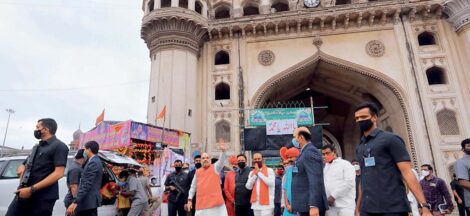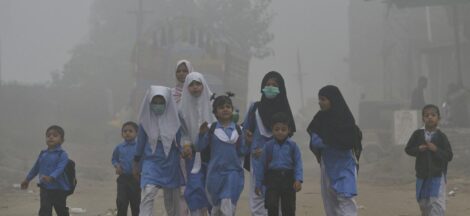By Nantoo Banerjee
Kerala might have witnessed this August the heaviest-ever rainfall since 1924 causing a disastrous flood killing over 300 people, rendering thousands homeless and destroying crops in nearly one million hectares of land, but experts assessing the causes behind the calamity and its impact substantially blame the local authorities and people for the flood intensity and nature of destruction. For long, the people and the administration in the hilly state, where the Western Ghats meet the Arabian Sea through several patches of land, forests, rivers and canals, had ignored or brushed aside the growing illegal quarrying, mining, waste dumping to choke canals, repurposing of forests and high-rise building constructions. And, now, the Keralites and the country are paying a heavy price of this partly man-made flood, financial cost of which has been roughly estimated at a staggering Rs.20,000 crore.
Going by the records and reports, in 1924, Kerala witnessed a more severe flood following a sustained heavy-to-heavy rainfall over a much longer period of time. The total rainfall recorded in 1924 in Kerala was 3,368 mm. This time it rained 2,086 mm till the third week of August, clocking about 30 percent above the annual average. Some 1,000 people lost their lives in 1924 Kerala floods when the modern system of disaster management was unknown to the country. Also, fortunately, Kerala did not have as many dams and dykes then as the state has today. Sudden and massive water release from these dams added to the disaster. However, as late as in 2011, the Madhav Gadgil Committee made a series of recommendations to the central government for the protection of the ecologically-fragile Western Ghats. Kerala has the highest number of vulnerable areas in the region. Sadly, few paid attention to ecologist Gadgil’s report.
While the nation is in the grief of the disastrous flood and human suffering in Kerala, going by the past experience, it is unlikely to learn much from the shocking event. Large parts of the country get flooded almost every year routinely causing big loss of life, livestocks and agriculture. A good part of them are absolutely man-made. Political leaders make air-borne surveys while refugees spend anxious nights in poor shelters, waiting for doles. Serious efforts are hardly made to desilt rivers and canals to improve water flow, stop construction by riverside and seashores, prevent sand and mineral quarrying and penalise those for stealing and wasting the precious river water and poaching natural forests along the rivers, seas and large water bodies.
Like the Gadgil Committee recommendations on ecological preservation in Kerala, several past important committee reports and recommendations, including the most talked-about KL Rao report on interconnection of national rivers, have been gathering dust in government cupboards. National governments come and go and so are the natural and manmade disasters. Among the states frequently witnessing flood are West Bengal, Assam, coastal Odisha, Bihar, UP, Andhra Pradesh, Uttarakhand, Tamil Nadu and Karnataka. Flood incidences are increasing rapidly. The only positive aspect is that the disaster management in India has become very organised. In the last decade, flood damaged more lives and economy than any other disasters.
Coastal India, including Kerala, is facing another major threat from soil erosion due to flood, climatic change and human neglect. Almost a third of the country’s 6,632km coastline had reportedly vanished due to soil erosion between 1990 and 2016. A National Centre for Coastal Research (NCCR) report found West Bengal coast as the ‘most vulnerable.’ Union Minister for Earth Science Harsh Vardan agrees. He told Parliament that the eastern coast had undergone more erosion in the past three decades, compared to the western coast. About 33 percent of the coast is under erosion. The NCCR report on the national assessment of shoreline changes along the Indian coast for the last 26 years lists West Bengal (63 percent) and Puducherry (57 percent) as most-vulnerable to erosion, followed by Kerala (45 percent) and Tamil Nadu (41 percent). Chennai-based NCCR director MV Ramana Murthy says: “Coastal erosion has become an alarming threat for the population and, if we do not take immediate steps, we would end up losing more land and infrastructure to the sea. The damage will be irreversible. Coastal population will bear the maximum brunt, especially villages and recent habitations, including buildings, hotels and resorts which are at risk.” The NCCR study said the country’s mainland lost about 234.25sq. km of land to the sea between 1990 and 2016. “West Bengal lost maximum land of 99.05sq. km during the period,” said NCCR scientist RS Kankara.
It seems such reports are okay only for academic discussions. Few in the central government have shown any serious intension to fight these disasters, including climate change impacts, despite reports and debates in Parliament and outside forums. Scientists say that while climate change and rising sea-levels have exacerbated the problem, dams on river basins have reduced the flow of sediments to the coasts. The UN Inter-Governmental Panel on Climate Change (IPCC) said sea levels have risen on an annual average of 3.2 mm since 1993. In the low-lying Sundarban islands, a UNESCO World Heritage site famed for mangroves and Royal Bengal tiger habitat, soil erosion is so rampant due to sea level rise that islands are shrinking in size. Two of the Sundarban islands – Lohachara and Suparibhanga – have been swallowed forever by the giant waters. Globally, the Sundarbans is now known as the land of vanishing islands. An ISRO satellite data analysis showed that in just one decade, the Sundarbans lost 9,900 hectares of its land mass. The questions are: what is the national government doing about it to muster global support to protect the Sundarbans and what permanent preventive measures are being taken to protect our shores, rivers, rivulets and canals against frequent floods? (IPA Service)
The post Flood, Coastal Erosion Need Strong Policy Intervention appeared first on Newspack by India Press Agency.


